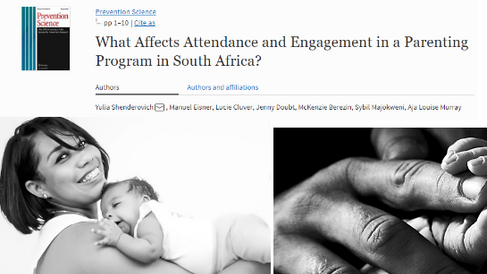
The United Nations' Sustainable Development Goals include ending all forms of violence against children. Good parenting practices have been identified as a protective factor that promotes children’s health and development in low-income countries, where child maltreatment is common. Yulia Shenderovich, Manuel Eisner, Lucie Cluver, Jenny Doubt, McKenzie Berezin, Sybil Majokweni and Aja Louise Murray explore how parent training programmes can secure the future of at-risk children. Read the full paper here.
ABSTRACT
Parenting programs are a promising approach to improving family well-being. For families to benefit, programs need to be able to engage families actively in the interventions. Studies in high-income countries show varying results regarding whether more disadvantaged families are equally engaged in parenting interventions. In low- and middle-income countries (LMICs), almost nothing is known about the patterns of participation in parent training. This paper examines group session attendance and engagement data from 270 high-risk families enrolled in the intervention arm of a cluster-randomized controlled trial in South Africa. The trial evaluated a 14-week parenting intervention aiming to improve parenting and reduce maltreatment by caregivers. The intervention was delivered in 20 groups, one per study cluster, with 8 to 16 families each. Overall, caregivers attended 50% of group sessions and children, 64%. Using linear multilevel models with Kenward-Roger correction, we examined child and caregiver baseline characteristics as predictors of their attendance and engagement in the group sessions. Variables examined as predictors included measures of economic, educational, and social and health barriers and resources, as well as family problems and sociodemographic characteristics. Overall, the study yielded no evidence that the level of stressors, such as poverty, was related to attendance and engagement. Notably, children from overcrowded households attended on average 1.2 more sessions than their peers. Our findings suggest it is possible to engage highly disadvantaged families that face multiple challenges in parenting interventions in LMICs. However, some barriers such as scheduling, and alcohol and substance use, remain relevant.
